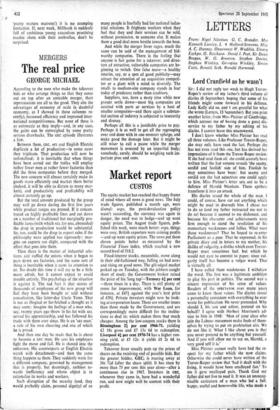Market report
CUSTOS
The equity market has reached that happy frame of mind where all news is good news. The July trade figures, published a month ago, were dismal: ergo, the post-devaluation policy wasn't succeeding, the currency was again in danger, the need was to hedge—and up went equity prices. The August trade figures, pub- lished this week, were much better: ergo, things were rosy, British exporters were coining profits —and up went equity prices. The news put them eleven points better as measured by the Financial Times index, which reached a new record level of 518.2.
Fixed-interest stocks, meanwhile, move along in their old-fashioned way, falling on bad news and rising on good news. The gilt-edged market perked up on Tuesday, with the jobbers caught short of stock: the Government broker raised the price of his 'long tap'—Treasury 64 per cent —three times in a day. There is still plenty of room for improvement, with War Loan, for instance, at £47f against the year's best price of £501. Private investors might now be look- ing at corporation loans. These are smaller issues than those made by the Government, and are correspondingly more difficult for the institu- tions to deal in; which makes them that much cheaper. Among the low-coupon stocks there is Birmingham 21 per cent 1966-71, yielding £2 18s gross and £7 13s 6d to redemption. Liverpool 41 per cent 1970-74 has a higher run- ning yield, at £5 12s: it yields £8 2s 6d to redemption.
Takeover fever usually puts up the prices of shares on the receiving end of possible bids. But the greater bidder, GEC, is roaring' away at 36s 74-d (after the share split). It has risen by more than 75 per cent this year alone—after a continuous rise in 1967. Investors in GEC, whenever they came in, have had a wonderful run, and now might well be content with their profit.










































 Previous page
Previous page